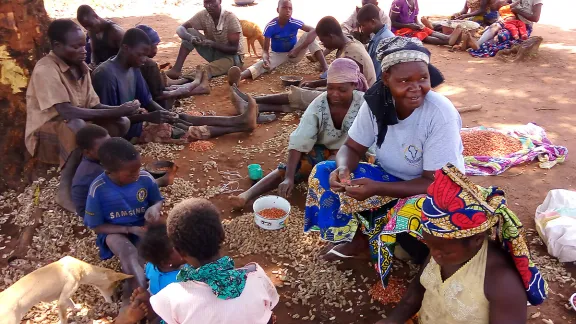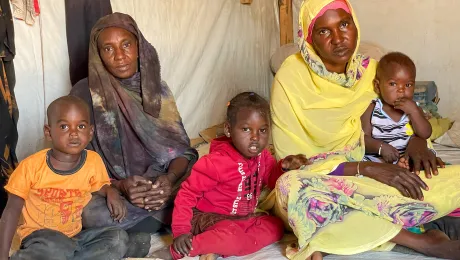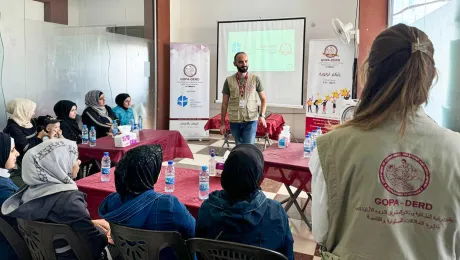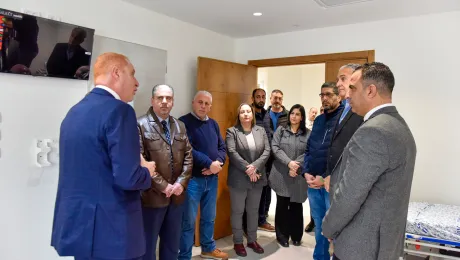
Community members meet under a big mango tree, pealing peanuts together. Photo: LWF/Central African Republic
‘More positive examples needed from the CAR’, says LWF team leader
The president of the AFUDES women’s group in the Central African Republic (CAR) could have fled during the bitter 2013 conflict but she instead decided to stay in her country, which is one of the poorest and most fragile countries in the world today.
Cecile, president of the community empowerment group, said it was a difficult decision because the conflict was especially challenging for women as they were not allowed to work in the fields while violent armed groups were present.
Community investment for increased livelihood
Three years ago the group was established with support from The Lutheran World Federation (LWF) and Diakonie Katastrophenhilfe along with the German government.
The group currently has 27 women and 10 men and it managed to get two hectares of land for cultivation. One hectare is used for peanut production, and one for growing rice and beans.
Many people in Cecile’s community left for safety to neighbouring Cameroon or Chad. The current situation in Cecile’s home town Bouar is stable but in many other areas LWF is facing difficulties accessing people in need. In one week more refugees crossed the border into Chad from the north of the CAR due to clashes between armed groups.
Cecile is married, 46 years old, and has six children. Some of them are studying in Guinea at the moment. She was elected president of AFUDES because people knew her and trusted her, since she is open and active in her community and local church.
Revenues and social impact
After putting aside the produced seeds for the next planting season the income of the group in 2016 was XAF 2 million (around EUR 3,048) bringing in about XAF 140.000 (EUR 213,43) for each member.
Some group members received a slightly lower amount as they had to pay back loans they took in order to be able to carry out their activities.
Group members managed to buy essential items such as a beds, mattresses, medicines and hygiene products. They also paid their children’s school fees or were able to send them to health clinics for treatment.
Nana Mamberé is one of the seven regions in CAR facing chronic food insecurity. It has a 40 percent severe malnutrition rate, indicating the health risks facing children and other vulnerable groups such as the elderly and pregnant women.
Gender balance
Within AFUDES there are 10 men and six couples participating on the agricultural plot. Men really wanted to be included in the group. From the six couples, two women had already participated in the group before their husbands joined them.
Still, the couples needed to have the same vision before they were accepted to participate in the group.
One of the men explained that when it comes to sharing revenue, it should be the woman who keeps the wallet. However, the couple decide together about what they should spend the money on, mostly for the children, the family and household needs.
Examples like this is what we need because people get more resilient and proactive in looking into livelihood improvements for themselves and their families.
Future prospects for CAR
Current challenges include bringing the harvest to the markets, or attracting traders from other villages to collect them.
To remain viable, the food storage and seed storage needs to be capable of resisting the heavy rainfall that lasts for six months.
Nicole Attro, the LWF team leader in CAR says, “We need more positive examples in the CAR. The huge needs in this area are clear and alarming. Examples like this is what we need because people get more resilient and proactive in looking into livelihood improvements for themselves and their families.”
She continues: “In the CAR of today, more than half of the population, an estimated 2.2 million people, are in need of immediate humanitarian life-saving assistance. However at the same time we should also focus to be there after the so-called early recovery phase has ended. We need to support sustainable development initiatives like this women’s group AFUDES.”
By Susan Muis, LWF Regional Program Coordinator for Central Africa
Visit our World Refugee Day page for more stories; photos and video.


